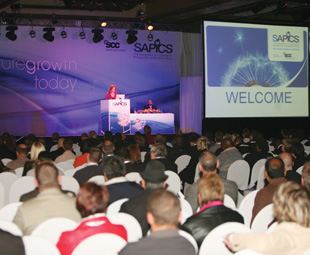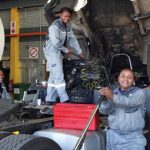Planning for future growth today

Delegates to the recent Sapics conference left the “best conference ever” revived and full of new ideas on how to change the operations management industry for the better.
The Association for Operations Management of Southern Africa (Sapics) recently held its 33rd annual conference at Sun City near Rustenburg.
More than 1 000 delegates attended the conference, with 60 national and international speakers sharing the benefit of their expertise.
The conference was hosted by Sapics – an organisation that aims to build excellence in operations management through education, comprehensive resources and a countrywide network of industry professionals – and the Supply Chain Council (SCC), an organisation for supply chain managers.
The aim of the conference was to provide insight into current trends, tools for growth and innovative solutions.
According to Liezl Smith, president of Sapics, it was “the best conference ever”.
“The positive response was overwhelming. Even some of our overseas guests said they had never attended a better conference,” she says.
 She adds that following the worldwide recession there is a new optimism in the industry. Companies are starting to realise that they have to apply themselves and work if they want to succeed in the very competitive environment of operations management.
She adds that following the worldwide recession there is a new optimism in the industry. Companies are starting to realise that they have to apply themselves and work if they want to succeed in the very competitive environment of operations management.
“For me, the networking is always the best. Nothing beats seeing old colleagues and friends again, making new ones and sharing ideas. There are many creative ideas out there, and through the forging of partnerships these ideas can become reality.
“We also had excellent speakers this year and I think everybody benefited from their knowledge,” she says.
Although Smith is very positive about the future, she acknowledges that there are some obstacles on the road ahead that need to be addressed and overcome. These challenges were discussed during the conference.
“Our biggest hurdle is the lack of skills. Operations management is a new discipline and is only now being recognised as a profession. People woke up a bit late, and now we do not have enough qualified and experienced people.
“The skills shortage is a worldwide problem and is not unique to South Africa. We do what we can to address this problem, but there are barriers. I think the biggest barrier is probably the red tape you face when you have to register with government as a training provider. It can take years and it is a very expensive process.
“Sapics is a training provider and we have been accredited for about two years now. Even when we were not accredited, we were providing training, because we believe in the importance of sharing knowledge and we do not believe that training should stop just because we had to wait for accreditation. But we did lose out on a lot of business because we were not accredited,” she says.
Sapics is a not-for-profit organisation and money earned from training and conferences is ploughed back into the industry.
She says another challenge is market uncertainties. “For instance, we do not know what is going to happen to the fuel price. It makes it very hard to plan properly.”
 There are also some uncertainties as far as legislation is concerned. One of these is in education, where government has not created an occupation-friendly environment.
There are also some uncertainties as far as legislation is concerned. One of these is in education, where government has not created an occupation-friendly environment.
The worldwide recession also had a big impact on the industry and it had to adapt to a new set of market conditions. “One thing that the recession has taught us is that it is no longer acceptable to waste anything. We have to run leaner operations to be able to survive. We have to cut down on cash, as well as inventory.
“We still have some way to go to become really efficient and competitive, but there are some areas where we have done really well.”
She says the local industry should also look at the rest of Africa for new opportunities. “We do not seem to see opportunities in Africa as viable. The Chinese are coming to Africa and they are doing extremely well here, but we are not doing the same. We tend to stick to Namibia and the other neighbouring countries. There are many opportunities further north in Africa. The way of doing business may be different, but it is definitely worth exploring,” she says.
Smith says she is very upbeat about the state of the industry. “It is going well. We are facing many challenges, but people have hope. And when people are hopeful, things can only get better,” she says.
Published by
Focus on Transport
focusmagsa




 !
From 1 Apri
!
From 1 Apri

 Big news from FOCUS on Transport + Logist
Big news from FOCUS on Transport + Logist





 FUSO: Driving the Future of Mobile Healthc
FUSO: Driving the Future of Mobile Healthc



 A brand
A brand




 Wondering about the maximum legal load for a
Wondering about the maximum legal load for a 
 The MAN hTGX powered by a hydrogen combus
The MAN hTGX powered by a hydrogen combus

 Exciting News for South African Operators
Exciting News for South African Operators
